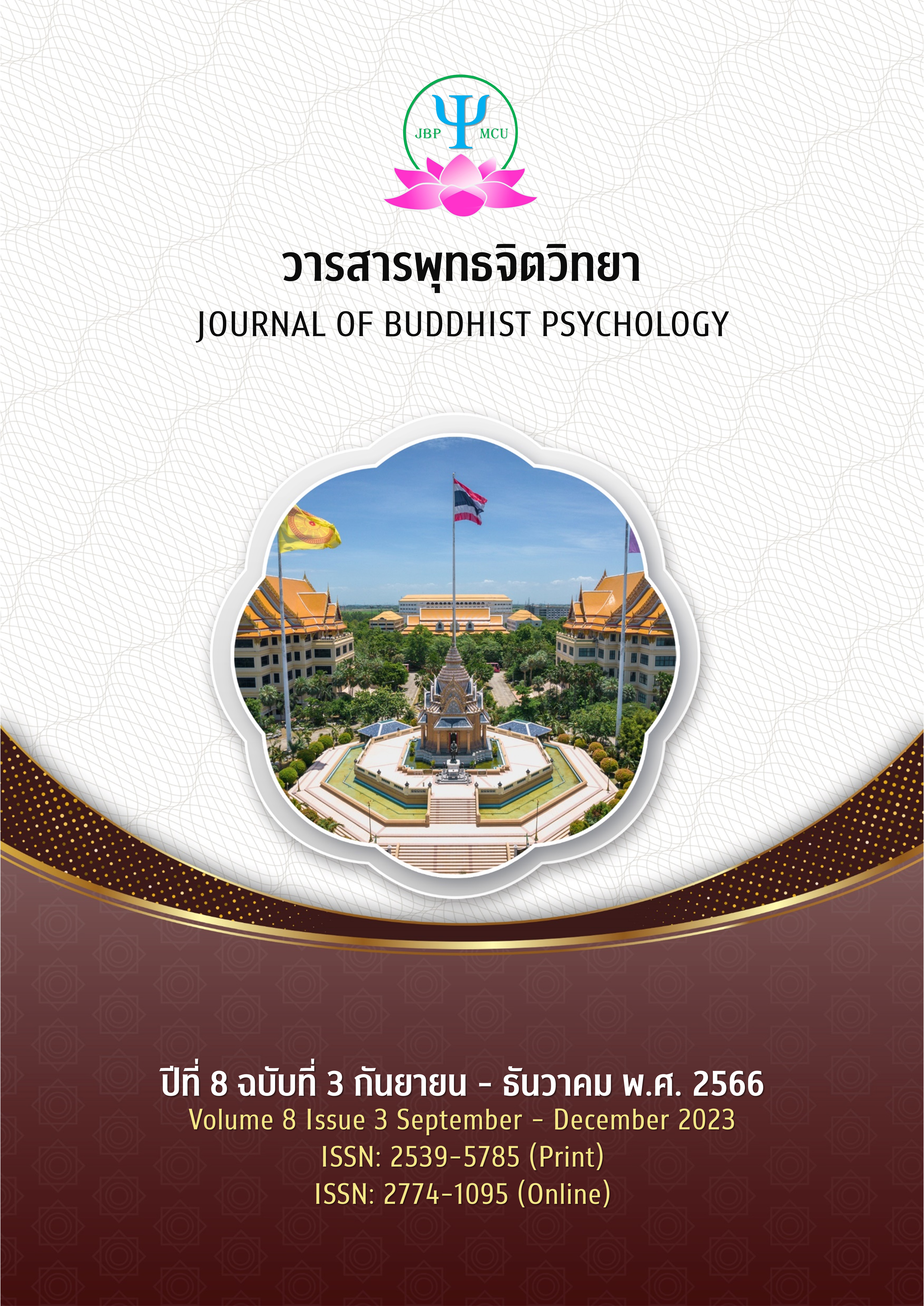ความเหนื่อยล้าจากการเห็นอกเห็นใจของผู้ให้การปรึกษาเชิงจิตวิทยา: การวิจัยเชิงปรากฏการณ์วิทยาแบบบรรยาย
Main Article Content
บทคัดย่อ
ในปัจจุบันงานวิจัยที่ศึกษาเกี่ยวกับความเหนื่อยล้าจากการเห็นอกเห็นใจส่วนใหญ่จะเกิดช่องว่างในเรื่องของโครงสร้างและความหมาย เนื่องจากโครงสร้างและความหมายในปัจจุบันยังไม่มีความตายตัว ไม่หยุดนิ่งมีข้อขัดแย้งในการให้ความหมาย มีการทับซ้อนกันของความหมายและมีความหมายใหม่ๆเกิดขึ้นตลอดเวลา งานวิจัยเชิงปรากฏการณ์วิทยาแบบบรรยายนี้จึงมุ่งทำความเข้าใจโครงสร้างและความหมายของประสบการณ์ความเหนื่อยล้าจากการเห็นอกเห็นใจของผู้ให้การปรึกษาเชิงจิตวิทยา โดยเก็บข้อมูลด้วยวิธีการสัมภาษณ์เชิงลึกกึ่งโครงสร้างและการบรรยายด้วยการเขียนกับผู้เข้าร่วมวิจัยที่เป็นผู้ให้การปรึกษาเชิงจิตวิทยาที่มีประสบการณ์ความเหนื่อยล้าจากการเห็นอกเห็นใจจำนวน 4 คน และวิเคราะห์ข้อมูลตามขั้นตอนของการวิจัยเชิงปรากฏการณ์วิทยาแบบบรรยายของกีออกี ผลการวิจัยแสดงให้เห็นถึงโครงสร้างทั่วไปของความเหนื่อยล้าจากการเห็นอกเห็นใจของผู้ให้การปรึกษาเชิงจิตวิทยาที่ประกอบไปด้วย 1. การขาดหรือมีประสบการณ์ในวิชาชีพที่จำกัด 2. การเกิดความรู้สึกร่วมไปกับความทุกข์ของผู้รับบริการ 3. การที่ไม่สามารถช่วยเหลือผู้รับบริการได้ 4. การไม่สามารถรับมือกับสภาวะอารมณ์ด้านลบจากการทำงานที่เกินขีดความสามารถของตัวเอง 5. การได้รับผลกระทบด้านลบทั้งทางด้านร่างกาย จิตใจ การทำงาน และความสัมพันธ์ ผู้วิจัยอภิปรายผลการวิจัยดังกล่าวเชื่อมโยงกับงานวิจัยที่เกี่ยวข้องและให้ข้อเสนอแนะเกี่ยวกับการนำผลการวิจัยไปใช้ในการดูแลตนเองของผู้ให้การปรึกษา(ฝึกหัด)และข้อเสนอแนะสำหรับการวิจัยในอนาคต
Article Details

อนุญาตภายใต้เงื่อนไข Creative Commons Attribution-NonCommercial-NoDerivatives 4.0 International License.
เอกสารอ้างอิง
Ablett, J. (2010). Secondary Traumatisation and Adversarial Growth : the Effects of Clinical Psychologist’s Work on Their Well-being (Doctoral dissertation). The University of Leicester.
Austin, W., Goble, E., Leier, B., & Byrne, P. (2009). Compassion Fatigue: The Experience of Nurses. Ethics and Social Welfare, 3(2), 195-214.
Bride, B. E. (2007). Prevalence of Secondary Traumatic Stress among Social Workers. Social Work, 52(1), 63-70.
Figley, C. (1995). Compassion fatigue as secondary traumatic stress disorder: An overview. The University of Tennessee, Retrieved April 22, 2022, from https://www.researchgate.net/ publication/245720535_Compassion_fatigue_as_secondary_traumatic_stress_disorder_An_overview
Lluch, C.; Galiana, L.; Doménech, P.; Sansó, N. (2022). The Impact of the COVID-19 Pandemic on Burnout, Compassion Fatigue, and Compassion Satisfaction in Healthcare Personnel: A Systematic Review of the Literature Published during the First Year of the Pandemic. Healthcare, 10, 364.
Joinson, C. (1992). Coping with Compassion Fatigue. Nursing, 22(4), 116-121.
Killian, K. (2008). Helping Till It Hurts? A Multimethod Study of Compassion Fatigue, Burnout, and Self-Care in Clinicians Working With Trauma Survivors. Traumatology, 14(2), 32-44.
Kirupakaran, C. S. (2013). The Lived Experience of Novice Counsellors: A Qualitative Phenomenological Approach. (A Thesis submitted to the Faculty of Graduate Studies). Winnipeg: University of Manitoba.
Kurtyilmaz, Y. (2015). Counselor trainees’ views on their forthcoming experiences in practicum course. Eurasian Journal of Educational Research, 61, 155-180.
Lee W., Veach P., MacFarlane I., & LeRoy B. (2015). Who is at Risk for Compassion Fatigue? An Investigation of Genetic Counselor Demographics, Anxiety, Compassion Satisfaction, and Burnout. Journal of Genetic Counseling, 24, 358–370.
McCann, I. L., & Pearlman, L. A. (1990). Vicarious traumatization: A framework for understanding the psychological effects of working with victims. Journal of Traumatic Stress, 3(1), 131–149.
Merriman, J. (2015). Enhancing Counselor Supervision Through Compassion Fatigue Education. Journal of Counseling & Development, 93(3), 370-378.
Najjar, N., Davis, L. W., Beck-Coon, K., & Doebbeling, C. C. (2009). Compassion Fatigue: A Review of the Research to Date and Relevance to Cancer-care Providers. Journal of Health Psychology, 14(2), 267-277.
Phillips, L. (2020). Grappling with compassion fatigue. Retrieved April 22, 2022, from https://ct.counseling.org/2020/08/grappling-with-compassion-fatigue/
Marit Råbu, Christian Moltu, Per-Einar Binder & John McLeod (2016). How does practicing psychotherapy affect the personal life of the therapist? A qualitative inquiry of senior therapists’ experiences, Psychotherapy Research, 26(6), 737-749.
Ronnestad, M. H., & Skovholt, T. M. (2013). The developing practitioner: Growth and stagnation of therapists and counselors. New York, NY: Routledge.
Sinclair, S., Raffin-Bouchal, S., Lorraine, V., & Mijovic-Kondejewski, J. (2017). Compassion fatigue: A meta-narrative review of the healthcare literature. International Journal of Nursing Studies, 69, 9-24.
Skovholt, T. M., & Trotter-Mathison, M. (2016). The resilient practitioner: Burnout and compassion fatigue prevention and self-care strategies for the helping professions (3rd ed.). New York, NY: Routledge.
Stamm, B. H. (2005). The ProQOL Manual. Retrieved April 22, 2022, from http://www.compas sionfatigue.org/pages/ProQOLManualOct05.pdf


